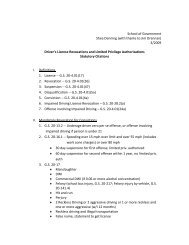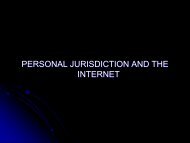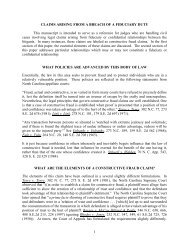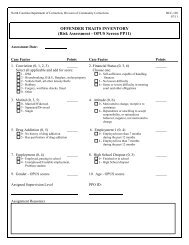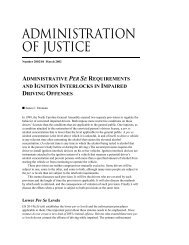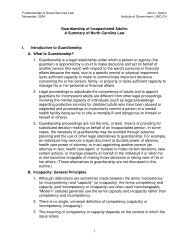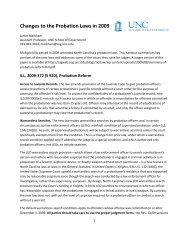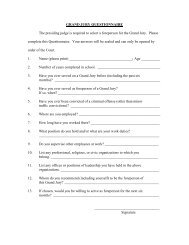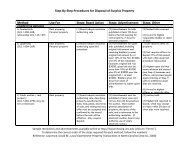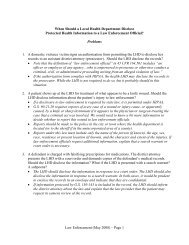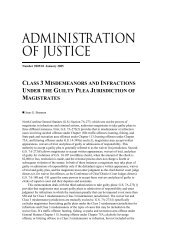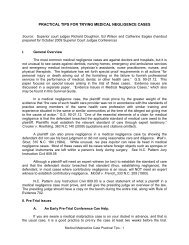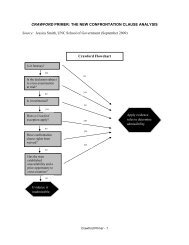Handout 1 - School of Government - University of North Carolina at ...
Handout 1 - School of Government - University of North Carolina at ...
Handout 1 - School of Government - University of North Carolina at ...
Create successful ePaper yourself
Turn your PDF publications into a flip-book with our unique Google optimized e-Paper software.
dismiss defendant’s claims for failure to prosecute. Nine months after th<strong>at</strong> the court entered an order<br />
denying plaintiff’s motion to dismiss and holding plaintiff in contempt for using the funds for improper<br />
purposes.<br />
Held: Affirmed.<br />
1. Although the trial court referred to the fund as a “constructive trust,” the case was properly in the<br />
district court because it was a contempt hearing in a child support case, not a trust accounting over<br />
which the superior court would have jurisdiction.<br />
2. Defendant had standing to bring the m<strong>at</strong>ter before the court because he had a substantial interest in<br />
how the fund was used.<br />
3. The trial court did not abuse its discretion when it denied plaintiff’s motion to dismiss for failure to<br />
prosecute.<br />
4. The order holding plaintiff in civil contempt was supported by the evidence and findings.<br />
Assessment <strong>of</strong> Attorney Fees in IV-D Case<br />
Guilford County obo Holt v. Puckett, ___ N.C. App. ___, 664 S.E.2d 362 (8/6/08).<br />
http://www.aoc.st<strong>at</strong>e.nc.us/www/public/coa/opinions/2008/070761-1.htm<br />
Facts: The child support agency brought an action on behalf <strong>of</strong> Holt, seeking p<strong>at</strong>ernity establishment,<br />
support, and past paid public assistance from Puckett. After a p<strong>at</strong>ernity test excluded the defendant, the<br />
action was voluntarily dismissed. The trial court granted defendant’s motion for <strong>at</strong>torney fees and ordered<br />
Holt to pay a portion <strong>of</strong> defendant’s <strong>at</strong>torney’s fees.<br />
Held: Reversed and remanded.<br />
1. Attorney fees cannot be awarded in a p<strong>at</strong>ernity action pursuant to G.S. 50-13.6. In the court’s<br />
discretion, however, they may be assessed as costs under G.S. 6-21.<br />
2. The trial court abused its discretion in ordering Holt to pay <strong>at</strong>torney fees. The county, not Holt,<br />
initi<strong>at</strong>ed the action, in which she was required to particip<strong>at</strong>e and cooper<strong>at</strong>e. The trial court did not find<br />
th<strong>at</strong> she was acting dishonestly or in bad faith. The court said th<strong>at</strong> assessing the fees against her was<br />
both inequitable and contrary to the st<strong>at</strong>utory scheme and purposes.<br />
3. The court noted th<strong>at</strong> the agency could have avoided litig<strong>at</strong>ion altogether by contacting the defendant<br />
and obtaining a p<strong>at</strong>ernity test before filing the action. It would be more equitable, the court said, to<br />
assess fees against the county. On remand the court said th<strong>at</strong> the trial court could, “in its discretion,<br />
make findings <strong>of</strong> fact and conclusions <strong>of</strong> law determining whether plaintiff, not Holt, should bear any<br />
portion <strong>of</strong> defendant’s <strong>at</strong>torney’s fees.”<br />
Dissent: Judge Hunter dissented and would have held th<strong>at</strong> the trial court did not abuse its discretion in<br />
awarding <strong>at</strong>torney fees. The dissent noted (1) th<strong>at</strong> there is no precedent for the position th<strong>at</strong> “bad faith”<br />
must be shown before <strong>at</strong>torney’s fees can be awarded as costs and (2) th<strong>at</strong> the majority discussed the<br />
“principles <strong>of</strong> equity” in rel<strong>at</strong>ion to plaintiff, but not in rel<strong>at</strong>ion to defendant.<br />
P<strong>at</strong>ernity<br />
Helms v. Landry, ___ N.C. App. ___, 671 S.E.2d 347 (1/6/09).<br />
http://www.aoc.st<strong>at</strong>e.nc.us/www/public/coa/opinions/2009/080033-1.htm<br />
Facts: The parties were never married, and their child was born in 1999. In 2001 both parties filed civil<br />
actions for custody <strong>of</strong> the child. The court joined the two actions and in 2002 entered an order finding th<strong>at</strong><br />
the parties were the child’s biological parents and giving custody to Mother (defendant) and visit<strong>at</strong>ion to<br />
F<strong>at</strong>her (plaintiff). In 2005, based on a substantial change <strong>of</strong> circumstances, the court gave permanent legal<br />
and physical custody to F<strong>at</strong>her and visit<strong>at</strong>ion rights to Mother. In 2007, Mother filed a motion seeking a<br />
DNA test to determine p<strong>at</strong>ernity, alleging th<strong>at</strong> F<strong>at</strong>her had never legitim<strong>at</strong>ed the child or sought a judicial<br />
determin<strong>at</strong>ion <strong>of</strong> p<strong>at</strong>ernity. The trial court dismissed the motion with prejudice on the basis th<strong>at</strong> it was not<br />
timely and had no basis in law or fact. Mother appealed.<br />
16



